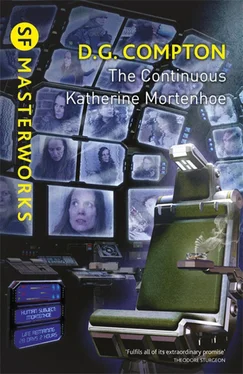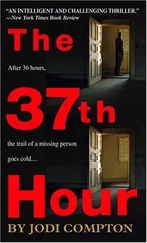Not the directors’ viewing room, which was being used by some gigantic Icelandic genius who nearly flattened me on the one occasion we met (I was coming out of the gents), but the tiny VIPs’ viewing room on the same floor. I was grateful to the leave-it-to-the-last-minute Icelander: NTV surely knew how to treat its Very Important People. For a start, the decor was Presidential Baroque, and probably bulletproof. The seats, eight of them, grouped informally, were white true-sheepskin, and fully servo-adjustable. And beside it stood a charming red plastic console offering individual Autosec facilities, an instantaneous translation service in the four World languages, memory-linked jotters, an intercontinental telephone, lines to the Information Center and the Personnel Data Bank, customized air-conditioning and dispensers for various beverages, hot and cold, sweet and sour, hard and soft. All that was lacking, maybe, was a silent vibro unit to take the labor out of jacking off in the bluer movies.
Mostly I stood at the back, unawed, making my notes on a couple of old envelopes.
It is hard for me now, when remembering that ten-hour session, not to color my recollections with understanding that came later. But if I’m to explain, let alone excuse, my behavior at that time, it’s absolutely vital that I do my best. You see, I’d caught very few of the original Human Destiny transmissions: I worked odd hours and, anyway, unlike some professionals, I’d never dedicated my every waking moment to the medium. I reckoned there were other ways of approaching the world than through a twenty-seven-inch oblong. So most of the material was new to me. And, packed into ten hours’ concentrated viewing, it was a staggering experience.
I should make it clear that not all the series were about terminals, not all of them ended in a clear death. There was, for example, a haunting case of progressive and incurable insanity. There were six cathartic shows analyzing the social rehabilitation of a totally limbless accident victim. There was even one sequence that ended in the surprise recovery of a woman whose compulsory abortion had been strongly opposed on psychiatric grounds. The camera hung around, waiting for her promised breakdown, but it never came. The director used the hoary old miracles-of-modern-science angle instead. It was strangely moving.
Different as they were, therefore, the programs all had one thing in common: they all aimed at total truthfulness about the human condition. ,
Each was an open-ended half-hour series, often — especially toward the ends of the terminal subjects — screened daily, and probing frankly and honestly into the mental and physical states both of the prime sufferers and of those family or nursing staff who accompanied them on their anguished journeys. They were sagas of human endurance, of the human spirit in extremis. Every one of them was a memorable viewing experience. I do not mean to suggest that in all the programs everyone was noble and everyone was brave: there was selfishness and degradation, cowardice, the petty jealousy of neighbors for the camera’s attention, the eager family grubbing for bequests, also the hatred of nurses working long unprofitable hours for demanding, stupid, hopeless, unworthy people. But these were real reactions, truthful reactions, human reactions. They struck home. They were without artifice, the ordinary reactions of ordinary people. They could not fail to remind each individual viewer of his or her own personal potential for good or bad, for the courageous or the shabby. They presented a clear choice -and with the choice the outcome, in terms of misery or joy. The effect on me of these programs, pounding in one after the other, was shattering.
Detractors of this level of truthful reportage always claimed that constant exposure to the spectacle of suffering dulled the sensibilities. The point about the suffering in the Human Destiny shows was that it was progressive. It could continue to excite horror and compassion because there was always a new agony in store. And, because there was time for study in depth, the participants could be shown as individuals, not merely as newsreel symbols — the burning soldier, the starving baby, the headless bomb victim. They were real people, with real mothers-in-law, and real dinners burning on the stove unheeded. It was details like this that kept the show alive, kept alive its capacity to involve.
Even now I can still remember that burning dinner, observed by the cool eye of the camera, cut back to, while the man lay on the sitting room floor in a seizure, urine staining the crylon carpet, a chair broken, the brother swearing cunt and bugger at the telephone, the wife (who could have been taking the children away, could have been turning down the gas) pushing at her husband with one red leather toe to see if this time he was really dead. And the full-face close-up when she found that he was not, and knew that the whole charade would be gone through again.
These were the moments a reporter might wait a life-time to capture. These were the moments the Human Destiny show came up with time and time again.
And the ratings showed that NTV was right in judging the public’s deep unconscious need. Its life was false, prettified into a bland, painless, deathless advertiser’s dream. The public wanted, and deserved, to be reminded that this was only a half of life, the half allowed by technology run wild.
For me there would be logistic problems, of course. Being my own camera was an inestimable advantage in terms of spontaneity, but it limited the angles. It meant that I would have, in some measure, to compose the scene in advance, and cut and direct it as I went along. Vincent would naturally reshape my material, but if I didn’t happen to be looking in the right direction at the right moment, then the moment was lost. And I’d be on my own, with no helpful floor manager to nudge my arm. It was just the challenge I’d been looking for. I’d do Katherine Mortenhoe proud.
I came out of the viewing room in a state of intimate communion with all mankind. The people I saw in the corridor, the same old TV people, were invested with a new immediacy. I was painfully aware of the bones beneath their flesh, of the heroism that might at any moment be expected of them. I couldn’t imagine how they could possibly go about their lives so unprepared. When one of them slapped me on the shoulder I could have wept for his fleeting vigor.
‘Roddie… where you been?’
‘Out of town.’ The surgery was still a well-kept secret.
‘Lucky fella. Thought I hadn’t seen you.’
‘Vincent gave me some time off. For good behavior.’
‘And now you’re back in it.’ He leaned closer, deodorized out of his mind. ‘I hear there’s a new terminal. And they say you’re getting her.’
‘Do they?’
‘Wise man. But you can’t go around with Vincent long these days without someone putting two and two together. He’s the king of the terminals. Or didn’t you know?’
‘He does other things.’
‘She’s all over the building, I tell you. Given three weeks. Some 36-26-36 number, working in an abortion clinic. Given three weeks. Absolute godsend.’
‘You don’t happen to know her name as well, do you?’
‘Matter of fact I do. Katie Mortenhoe. Not an easy one to forget. Absolute godsend. They say the series was on the skids, couldn’t find as much as a spastic. Vincent must be busting his Y-fronts over this one.’
‘He seemed cheerful enough this morning.’
‘That’s how you do it, Roddie. Hear all, see all, say nowt. But I’ve never known a buzz as loud as this be wrong. You’re getting our little Miss Mortenhoe, believe you me.’
I watched him bulldoze his way on down the corridor and around the corner out of sight. His little Miss Mortenhoe was five-foot-nine, twice married, forty-four, with a face like a female politician and a figure she didn’t think much of, so that nobody else thought very much of it either. I knew also that she was capable, far more than he was, of suffering. Capable of. Capable of far more.
Читать дальше












